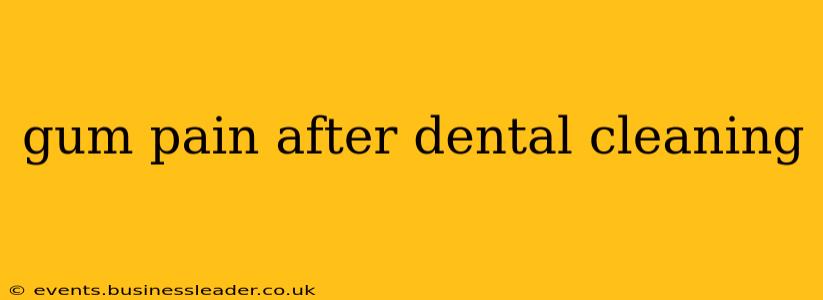Experiencing gum pain after a dental cleaning is more common than you might think. While a professional cleaning is crucial for maintaining oral health, some discomfort is sometimes a side effect. Understanding the causes, how to alleviate the pain, and when to seek further professional help is key to ensuring a swift recovery and preventing future issues.
What Causes Gum Pain After a Dental Cleaning?
Several factors can contribute to gum pain following a dental cleaning. The most common culprits include:
-
Inflammation: The cleaning process, while beneficial, can temporarily irritate already inflamed gums. If you have gingivitis (gum inflammation) or periodontitis (gum disease), the cleaning might initially increase sensitivity and pain as the plaque and tartar removal stimulates the affected tissues.
-
Aggressive Cleaning: While rare with experienced hygienists, overly vigorous cleaning can traumatize the gums, leading to soreness and pain.
-
Instrumentation: The instruments used during the cleaning, particularly the scaler used to remove tartar, can cause minor abrasions or irritation to the gums. This is usually temporary.
-
Underlying Gum Disease: Existing gum disease, even if undiagnosed, can exacerbate the discomfort following a cleaning. The cleaning process may expose underlying problems that were previously masked.
How Long Does Gum Pain After a Dental Cleaning Last?
The duration of gum pain varies depending on the individual and the severity of the underlying gum health. For many, the pain is mild and subsides within a day or two. However, if the pain persists for more than a few days, or worsens, professional attention is recommended.
Home Remedies for Gum Pain After Cleaning
Several at-home remedies can help soothe sore gums after a dental cleaning:
-
Saltwater Rinse: Dissolving a half-teaspoon of salt in 8 ounces of warm water and rinsing gently several times a day can reduce inflammation and pain.
-
Cold Compress: Applying a cold compress to your cheek can help numb the area and reduce swelling.
-
Over-the-Counter Pain Relief: Non-steroidal anti-inflammatory drugs (NSAIDs) like ibuprofen can help manage pain and inflammation. Always follow the recommended dosage.
-
Gentle Brushing and Flossing: Continue your regular oral hygiene routine, but be extra gentle while brushing and flossing.
-
Avoid Irritants: Avoid hot or acidic foods and drinks that could further irritate your gums.
When Should I See a Dentist About Gum Pain After Cleaning?
While some mild discomfort is expected, it's crucial to contact your dentist if you experience:
-
Severe or persistent pain: Pain that lasts longer than a few days or significantly interferes with your daily activities requires attention.
-
Increased bleeding: Bleeding that doesn't subside after a couple of days or is excessive warrants a checkup.
-
Swelling: Significant swelling or redness around the gums could indicate an infection.
-
Pus: The presence of pus is a clear sign of infection and requires immediate dental attention.
-
Fever or chills: These symptoms suggest a more serious infection and necessitate immediate medical attention.
Can Gum Disease Cause Pain After Cleaning?
Yes, existing or undiagnosed gum disease can significantly increase the likelihood of experiencing pain and discomfort after a dental cleaning. The cleaning process might reveal the extent of the gum disease, which might have previously gone unnoticed. Proper diagnosis and treatment of gum disease are essential to prevent further complications.
How Can I Prevent Gum Pain After My Next Cleaning?
Preventing gum pain after your next cleaning involves proactive steps:
-
Maintain excellent oral hygiene: Regular brushing, flossing, and using mouthwash can significantly reduce the chances of inflammation and gum disease.
-
Schedule regular dental checkups: Preventative care is key. Regular cleanings and checkups allow dentists to detect and address potential problems early on.
-
Inform your dentist about any concerns: Before your cleaning, openly discuss any sensitivities or concerns about potential gum pain with your dentist or hygienist.
By understanding the potential causes of gum pain after a dental cleaning, knowing when to seek professional help, and taking proactive steps to maintain excellent oral hygiene, you can ensure a comfortable and healthy dental experience. Remember, regular dental visits are crucial for preventing and managing gum health issues.
